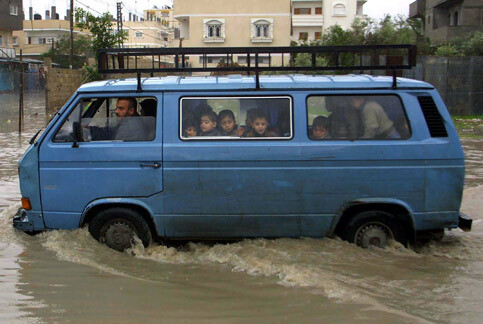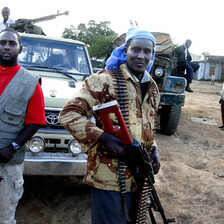The Electronic Intifada 3 January 2007

Does Israel not have obligations to these refugees too? Palestinians struggle through floodwater in the Rafah refugee camp in the south of the Gaza Strip, 27 December 2006. (MaanImages/Hatem Omar)
On New Year’s Day, notions of resolve, reform, or reflection come as no surprise on newspaper editorial pages. Similarly unsurprising are the op-eders that carry on with business as usual. Things were no different on Ha’aretz’s opinion page, which kept an even keel of New Yearisms. Rather untypical, however, was the limited role that honesty played in the mix.
The most curious example was the lead editorial, — often viewed as any paper’s mouthpiece — entitled, “Our obligation to refugees, as refugees.” One might guess that it covered the subject of Palestinian refugees, a conundrum that has crippled every “peace process” since Israel’s creation in 1948. Subsequent to the expulsion of some 800,000 Palestinians during that period, Israeli perceptions of the refugee problem back then led almost directly to the state’s claim as an inclusive democracy now. To prevent the imminent return of refugees, Israel gave the remaining Palestinian population (then about 150,000 and now about 1.4 million) Israeli ID cards, thus creating the minority known as the “Israeli Arabs.” A cynical interpretation is that ID cards back then served the purpose that fences and walls serve now: demographic control. More cynical still is the extent to which Israel is an inclusive democracy — take the state-sanctioned Arab-Jew segregation in public schools, service distribution, housing rights, and just about everything else. Even the country’s political establishment left considers “a state for all citizens” treasonous words.
But let us not stray too far. “Our obligation to refugees, as refugees” was concerned with the 300 Sudanese refugees who were recently denied amnesty in Israel. For a citizenry that swallows a daily existence as segregated, racialized, discriminatory, administratively unfair, and internationally outlawed, Sudan is a digestible, understandable distraction. It is also a liberal cause, perhaps as much so as Liberia was to all those well-meaning Confederates in 1847. Almost any country, particularly your correspondent’s, can ignore its domestic qualms and purport to “do something” about Sudan.
The hitch, however, is self-awareness, and this is where Ha’aretz gives its intentions away. The piece tactfully ignores the Palestinian refugee problem while examining how “dulling the senses has overtaken Israeli society,” vis-à-vis the Sudanese refugees and the Jewish refugees (later to become colonizers) who fled European anti-Semitism. Influential Israeli scholars have also adopted this tone. “As members of the Jewish people, for whom the memory of the Holocaust burns, we cannot stand by as refugees from the genocide in Darfur hammer on our doors,” Avner Shalev, chairman of Yad Vashem, Israel’s Holocaust museum, told The Christian Science Monitor on Tuesday. Meanwhile, Israeli human rights groups plan demonstrations for next Monday outside of Prime Minister Ehud Olmert’s residence.
It would seem that Ha’aretz, which has repeatedly demonstrated a critical lens on Israel’s political ironies, would grant at least a token acknowledgement to this one, especially as it calls on Israel to “open its gates, and also its heart, to the refugees.” References to Palestinian refugees, even in the most minimal sense, are nowhere to be found. It is as if for a moment, one of the most salient topics of Israeli politics leaves the editorial conscience. Then readers are asked to remember the Jewish refugee narrative in isolation from that of the Palestinians, although the two are inseparable. One can only ask, is this editorial about Sudanese refugees in the first place? Or is it about overwriting the historical conscience? Such exercises are the things of Israeli “birthright tours,” not newspaper editorials.
Next in line is the op-ed by Yair Sheleg, entitled, “A time for Western soul-searching,” which amounts to a fear-invoking extravaganza about the “Iranian threat,” and how Israel has to do “Western” soul searching in uniting against this common enemy, which presumably sprang from nowhere to haunt innocent Western-oriented democracies. Like America’s political establishment right and its willfully misled followers, who forgivingly weathered lies on Saddam’s “weapons of mass destruction,” Sheleg is prepared to accept the party line on Iran. This despite U.S. intelligence experts who have discredited Iran’s capacity as a threat, and the political logic that Iranian President Ahmedinejad, like his Israeli counterparts, strategically speak in one voice to the international audience, and in quite another to the domestic masses. Like the editorial, one may question the honesty of Sheleg’s presentation — did he come here to discuss or campaign?
Not surprisingly, Sheleg fashions his own ambiguous logic: “And this is where the basic Western paradox arises: The West can sustain its free identity over time only if it has the sense to give up certain elements of it (free trade, some aspects of human rights) in the war with its enemies. Or to put it another way: The West must be prepared to sacrifice something of its present for the sake of ensuring its future.” Sheleg’s New Year prescription is to sacrifice “human dignity” and “individual rights” in order to fight “Islamic fundamentalism” — left conveniently open-ended and not exclusive to Iran — effectively.
In the process, Sheleg repeats a process that many Zionists have done before him, which is to sacrifice pre-Zionist Jewish identity, and everything it could potentially mean in the region, for the whims and agendas of Western powers. Unlike his other bold proposals, Sheleg seems beyond self-awareness on this point. And the price? Nazir Mgally’s op-ed, titled “Not a democratic dream,” which scrutinizes the “Wild West” audacity that ushered Saddam to the gallows, has Sheleg’s answer: “Even in Jerusalem there is no reason to rejoice because after the U.S. understands what is happening to it, the country will turn its back on all partners to the rejoicing and preserve its own interests even at the price of giving up democracy.”
Where self-awareness is lacking in Sheleg and the lead editorial, Akiva Eldar’s op-ed, “Forty years of ambiguity,” is somewhat redeeming. Rather than adopt someone else’s political rhetoric — the lead editorial, for instance, also managed to invoke the “Iranian threat,” don’t ask how — Eldar presents both names to every story, and trusts the reader to his own devices. He writes, “The year 2007 will mark 40 years since the occupation of the West Bank, or 40 years since the liberation of Judea and Samaria. Next year, we will celebrate Jerusalem Day, the unilateral annexation of East Jerusalem, or 40 years since the reunification of the capital.” His point is not to campaign one appellation over another, but to do what responsible journalists do: navigate the distance between them. As Eldar shows, these waters are plagued with an intended ambiguity, where self-awareness is avoided at all costs.
This narrative involves Henry Kissinger’s “constructive ambiguity,” the foreign policy that the United States has continually applied to the Middle East — trumpeting secularism while fawning affections on the Saudi regime; hanging Saddam while purporting to thwart sectarianism — and one that Israel applies to its Palestinian neighbors. “It is hard to think of a more destructive phenomenon than the ambiguous approach of the Israeli establishment to issues related to the occupied/liberated/administered territories,” Eldar writes, double-speak in tact.
Eldar’s intended irony is an essence of Israeli journalism that cannot be ignored. Rather than condemn Israelis who want history to begin, stop, or continue from an arbitrary point that suits their politics, Eldar grants them occasion. “What to do with the Palestinian population that insists on sticking to its land and threatens to spoil the demographic balance?” he writes. Showing Israeli discourse for what it is, rather than telling his readers how to think, Eldar exposes the absurdities for what they’re worth. He closes, “And, in order to protect ourselves from the Palestinians, for whom the occupation is not at all ambiguous, we invent an ambiguous policy of assassinations, blockades and shootings.”
It does not require a clairvoyant to guess whose sentiments on the January 1, 2007 Ha’aretz editorial page will become New Year political realities. Indeed, old acquaintances will be forgotten, the first among them our consciences.
Zachary Wales is a regular contributor to the Electronic Intifada.





